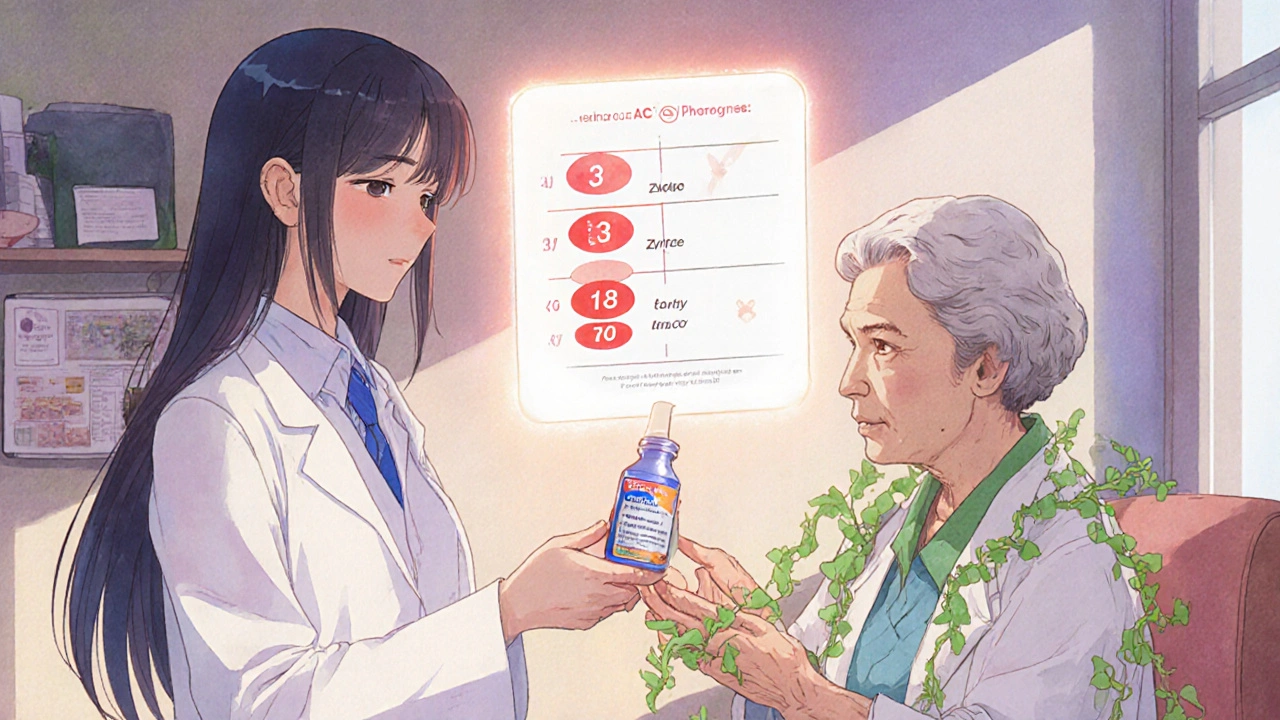Anticholinergic Burden Calculator
What Is This Tool?
This calculator helps you determine your total anticholinergic burden score based on your medications. The Anticholinergic Burden (ACB) Scale assigns scores from 0-3 to medications that block acetylcholine. A score of 3 or higher indicates increased risk of confusion, falls, and dementia, especially in older adults.
Your Anticholinergic Burden Score
Every night, millions of older adults reach for a pill to help them sleep or ease allergy symptoms. It’s often something simple: Benadryl, Sominex, or a generic diphenhydramine tablet. They don’t think of it as medicine with serious side effects. But when taken daily, especially alongside other common prescriptions, these pills can quietly pile up in the body and trigger something dangerous: cumulative anticholinergic burden.
What Exactly Is Anticholinergic Burden?
Anticholinergic burden isn’t about one drug. It’s about the total effect of all the drugs in your system that block acetylcholine - a brain chemical critical for memory, attention, muscle control, and bladder function. Think of it like turning down the volume on your nervous system. One drug might lower it a little. But when you stack multiple drugs with this effect, the volume drops so low that your brain and body start to malfunction. This isn’t theory. It’s measured. Since 2008, doctors have used the Anticholinergic Burden (ACB) Scale to score medications. Each drug gets a number: 0 for no effect, 1 for mild, and 2 or 3 for strong. The higher your total score, the greater your risk. A score of 3 or more is a red flag - especially for people over 65.Why Antihistamines Are the Hidden Culprit
Not all antihistamines are the same. Second-generation ones like loratadine (Claritin), cetirizine (Zyrtec), and fexofenadine (Allegra) barely touch acetylcholine. Their ACB score is 0 or 1. Safe for most people. But first-generation antihistamines? That’s where the danger lives. Diphenhydramine (Benadryl), chlorpheniramine, doxylamine (Unisom), and hydroxyzine? They’re strong anticholinergics - ACB score of 3. They’re in sleep aids, cold meds, motion sickness pills, and even some allergy tablets. And they’re everywhere. You can buy them without a prescription. No warning label says, “This may cause dementia.” Here’s the catch: people take them for years. For sleep. For allergies. For nausea. They don’t realize they’re slowly poisoning their brain chemistry.The Perfect Storm: When Antihistamines Meet Other Drugs
The real problem isn’t just antihistamines alone. It’s what they’re mixed with. Older adults often take five or more medications daily. Many of those are also anticholinergic. Take this common combo:- Diphenhydramine (Benadryl) - ACB 3
- Amitriptyline (for nerve pain or depression) - ACB 3
- Oxybutynin (for overactive bladder) - ACB 3

What Symptoms Should You Watch For?
Anticholinergic burden doesn’t announce itself with a siren. It creeps in. Common signs in older adults:- Memory lapses that feel “off” - forgetting names, misplacing keys, repeating stories
- Getting lost in familiar places
- Difficulty concentrating during conversations
- Blurred vision or trouble reading
- Dry mouth, constipation, or trouble urinating
- Dizziness, unsteadiness, or falls
- Unexplained fatigue or confusion - mistaken for dementia
How to Check Your Burden - And What to Do
You don’t need a lab test. You need a list. Step 1: Write down every medication you take - including vitamins, supplements, and over-the-counter pills. Don’t forget the sleep aids, allergy meds, or stomach remedies. Step 2: Look up each one on the ACB Scale. You can find free lists from NPS MedicineWise, the American Geriatrics Society, or IU Center for Aging Research. Diphenhydramine? ACB 3. Oxybutynin? ACB 3. Amitriptyline? ACB 3. Loratadine? ACB 0. Step 3: Add them up. If you’re at 3 or higher, talk to your doctor or pharmacist. Don’t stop cold turkey. But do ask: “Is there a safer alternative?” Here’s what works:- Swap diphenhydramine for cetirizine or loratadine for allergies.
- Replace Unisom or Benadryl for sleep with melatonin or cognitive behavioral therapy for insomnia (CBT-I).
- Ask if your bladder medication can be switched to mirabegron (Betmiga), which has no anticholinergic effect.
- Check if your depression or pain meds can be changed to SSRIs or SNRIs that don’t block acetylcholine.

Why Doctors Miss This - And How to Advocate for Yourself
Most doctors don’t ask about over-the-counter meds. They assume you’re not taking them. Or they don’t know the ACB scale. Only 62% of primary care practices in the U.S. use it in 2023 - up from 15% in 2015, but still far from universal. You have to speak up. Bring your list. Say: “I’m worried my meds might be making me foggy or unsteady. Can we check my anticholinergic burden?” The FDA added warnings to first-gen antihistamine labels in 2017. The European Medicines Agency banned chronic use in seniors over 65 in 2019. The American Geriatrics Society calls these drugs “potentially inappropriate” for older adults. Yet they’re still sold on every pharmacy shelf.It’s Not About Fear - It’s About Awareness
This isn’t about demonizing antihistamines. It’s about understanding that medicine isn’t harmless just because it’s available over the counter. What’s safe for a 30-year-old with seasonal allergies isn’t safe for a 70-year-old on three other meds. The good news? This burden is reversible. Unlike dementia, which can be permanent, anticholinergic brain fog often lifts once the drugs are stopped or swapped. Studies show healthcare use drops by 11-33% when anticholinergic burden is reduced. Your brain doesn’t need to be sedated to sleep. Your allergies don’t need to be drowned in anticholinergics. There are better, safer ways - if you know where to look.What You Can Do Today
- Look at your medicine cabinet. Find any pill with “diphenhydramine,” “chlorpheniramine,” or “doxylamine” on the label.
- Check if you’re taking any of these: amitriptyline, oxybutynin, benztropine, or promethazine.
- Write down every pill - even the ones you take “only when needed.”
- Call your pharmacist. Ask: “Can you check my total anticholinergic burden?”
- Ask your doctor: “Can we replace any of these with non-anticholinergic options?”
Can over-the-counter antihistamines really cause dementia?
Yes - not directly, but cumulatively. Long-term use of first-generation antihistamines like diphenhydramine (Benadryl) adds to your total anticholinergic burden. A major 2015 study in JAMA Internal Medicine found that people who took strong anticholinergics daily for more than three years had a 54% higher risk of dementia. Antihistamines made up nearly 30% of those drugs. It’s not a guarantee, but it’s a measurable, avoidable risk.
Is Claritin or Zyrtec safer than Benadryl?
Yes. Second-generation antihistamines like loratadine (Claritin), cetirizine (Zyrtec), and fexofenadine (Allegra) have an ACB score of 0 or 1 - meaning they barely affect acetylcholine. Benadryl (diphenhydramine) has a score of 3. If you’re over 65 or taking other meds, switching to Claritin or Zyrtec can cut your anticholinergic burden in half overnight.
Can I stop taking Benadryl cold turkey if I’ve been using it for sleep?
Not always. Stopping suddenly after long-term use can cause rebound insomnia or anxiety. Work with your doctor or pharmacist to taper off slowly. Replace it with non-drug options like sleep hygiene, melatonin, or cognitive behavioral therapy for insomnia (CBT-I). Many people successfully switch within 4-8 weeks with a plan.
What if my doctor says my meds are fine?
Ask for the ACB Scale score for each of your medications. If they don’t know what it is, ask to speak with a pharmacist. Many hospitals and clinics now have medication reviews built into annual checkups. You have the right to know how your drugs interact. If your total score is 3 or higher, you’re in a high-risk group - and you deserve a safer plan.
Are there any non-medication ways to treat allergies or insomnia?
Yes. For allergies: use nasal saline rinses, HEPA filters, and allergen avoidance. For sleep: stick to a consistent bedtime, avoid screens before bed, keep your room cool, and try CBT-I - which studies show works better than sleeping pills long-term. These aren’t quick fixes, but they’re safer, lasting, and don’t add to your anticholinergic burden.


Bro, I had no idea Benadryl was basically brain poison for older folks 😳 I’ve been giving it to my dad for sleep for years… time to swap it for melatonin. Thanks for the wake-up call.
Wow. Just… wow. I mean, really-this is the kind of thing that gets buried under the noise of pharmaceutical marketing. People think, ‘It’s over-the-counter, so it’s safe.’ But no-it’s not. Not when you stack it with amitriptyline, oxybutynin, and who-knows-what-else. The ACB scale? It’s not a suggestion. It’s a lifeline. And yet, most doctors don’t even know it exists. Sad. Truly.
Let’s be real-this isn’t about ‘awareness.’ It’s about lazy prescribing and patients who won’t take responsibility. If you’re taking five meds and a sleep aid from the drugstore, you’re not ‘just aging,’ you’re playing Russian roulette with your cognition. Stop blaming the system. Start auditing your own cabinet.
I actually printed out the ACB scale and went through my mom’s meds with her last week. We found three things with a score of 3-including her ‘just for allergies’ Zyrtec-D (which has pseudoephedrine, but also diphenhydramine in the combo). She cried because she thought she was doing the right thing. We switched her to Claritin and a sleep mask. She’s slept better than in 5 years.
This is one of the most important posts I’ve seen all year 🙏 I shared it with my entire family group chat. My grandma was diagnosed with ‘early dementia’-then we stopped her Benadryl and Unisom. Within 3 weeks, she remembered my name again. No magic. Just chemistry. Thank you for writing this.
Okay, I need to say this gently but clearly: if you’re over 60 and taking anything with diphenhydramine, chlorpheniramine, or doxylamine, please-please-talk to someone. Not your cousin. Not Reddit. Your pharmacist. They’re trained to catch this stuff. And if they don’t know the ACB scale, find one who does. Your brain is worth it.
Why are we letting Big Pharma get away with this? They market these pills like candy. ‘Sleep better tonight!’ No-sleep better without poisoning your brain. America’s healthcare system is broken. We need real regulation, not ‘awareness campaigns.’
This isn’t just a medical issue-it’s a revolution in how we treat aging. We’ve been treating older people like broken machines that need more pills. But sometimes, the fix isn’t more medicine-it’s LESS. Less anticholinergics. Less sedation. More sleep hygiene. More movement. More connection. This post? It’s the first step in a new way of living. I’m printing this and handing it to every senior I know.
Excellent, thoughtful piece. I work in a community pharmacy, and I see this daily. A man came in last Tuesday asking for ‘the blue sleep pill’-diphenhydramine-because his doctor ‘told him it was fine.’ I checked his script: amitriptyline, oxybutynin, and now this. Score of 9. He left with a list of alternatives and a tear in his eye. We need more of this. Not less.
you guys are overreacting its just benadryl how can one pill cause dementia? in india we give this to kids for allergies and no one gets dementia. you americans are too scared of everything. just take your pills and stop worrying.
Actually, the study cited has significant confounding variables. Many participants had pre-existing cognitive decline. Also, correlation is not causation. And why are you assuming all older adults are taking multiple medications? Not everyone does.
My aunt took Benadryl for 12 years. Started forgetting birthdays, then her own address. We switched her to melatonin and a weighted blanket. Six months later, she was telling stories from her wedding day like it was yesterday. This isn’t hype. It’s science. And it’s personal.